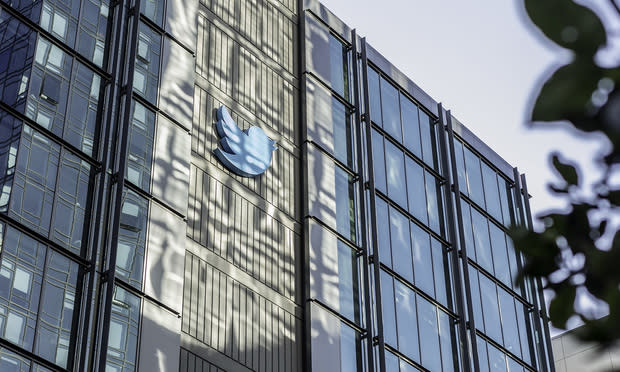Derivative Suit Against Twitter Directors Lands in Del.
[caption id="attachment_1296" align="aligncenter" width="620"]

Twitter headquarters located at 1355 Market St., Suite 900 San Francisco, California, 94103. Photo Credit: Jason Doiy/ALM[/caption] A derivative suit accusing Twitter Inc.'s directors of insider selling and unjust enrichment landed in Delaware federal court on Monday, after the parties agreed to transfer the case from California. The lawsuit, originally filed in October 2016, alleges that members of the San Francisco-based social media giant's board misled investors in early 2015 with overly optimistic reports regarding user engagement, causing the company's stock price to spike at artificially high levels. According to the complaint, directors then sold their personal stock for "hundreds of millions" of dollars in insider profits before the supposed misrepresentations were discovered. Plaintiff Jim Porter originally filed the case in the U.S. District Court for the District of Northern California, but the parties in December agreed to transfer the case, rather than litigate a forum selection clause in Twitter's bylaws, requiring any derivative action brought on behalf of the company to be litigated in Delaware state or federal court. U.S. District Judge Jon S. Tigar of the Northern District of California approved the transfer Jan. 5, and the case was filed in U.S. District Court for the District of Delaware on Monday. In the stipulation, the defendants retained all defenses and objections to jurisdiction, forum and venue, and Porter reserved his challenges to Twitter's corporate bylaws. The transfer had no bearing on a separate securities class action still pending in the California federal court. The lawsuit accuses Twitter's directors of falsely reporting meaningful growth in user engagement on the social media platform dating back to February 2015. According to Porter, the company was tracking "low-quality" daily and monthly active users on its website, instead of timeline views as the primary metric for user engagement. Porter said the misleading statements caused the company's stock to rise dramatically, reaching a high of $52.87 per share. During that time, Porter said, board members breached their fiduciary duties by selling off their personal holdings, knowing that the stock price would soon plummet. "While the company’s stock price was artificially inflated, certain Individual defendants exploited their positions as corporate fiduciaries of Twitter and, with knowledge of material, adverse and nonpublic information regarding the company’s operations and business prospects, sold their personal stock holdings for hundreds of millions of dollars in insider profits," Porter's attorneys said in the 49-page complaint. According to Porter, one member of Twitter's board received more than $274 million for sales of the allegedly inflated stock, while Richard Costolo, Twitter's former CEO, and its current executive Jack Dorsey made about $3 million and $3.6 million, respectively. Porter said the alleged misrepresentations finally came to light in July 28, 2015, when Twitter reported that its monthly active users had only increased by only 1 percent. The company told investors that low levels of user growth and engagement were expected to continue for the foreseeable future. The following day, the complaint said, Twitter's stock fell by $5.30, or 15 percent, to close at $31.24, resulting in a loss of "hundreds of millions of dollars in market capitalization." "Despite these poor financial results, Twitter’s senior officers continue to be rewarded with lavish compensation, and have personally profited at the expense of the company and its shareholders," Porter said. Twitter's press office on Tuesday declined to comment on the lawsuit, and an attorney for Porter was not immediately available to comment. The suit seeks damages and restitution from the director defendants of profits obtained as a result of the transactions. Porter is also pressing for changes to Twitter's corporate governance and systems of internal controls to prevent alleged wrongdoing in the future. The case in Delaware has not yet been assigned to a judge, and Delaware counsel for the parties was not listed Tuesday by an online docket-tracking service. The case is captioned In re Twitter Shareholder Derivative Litigation.

